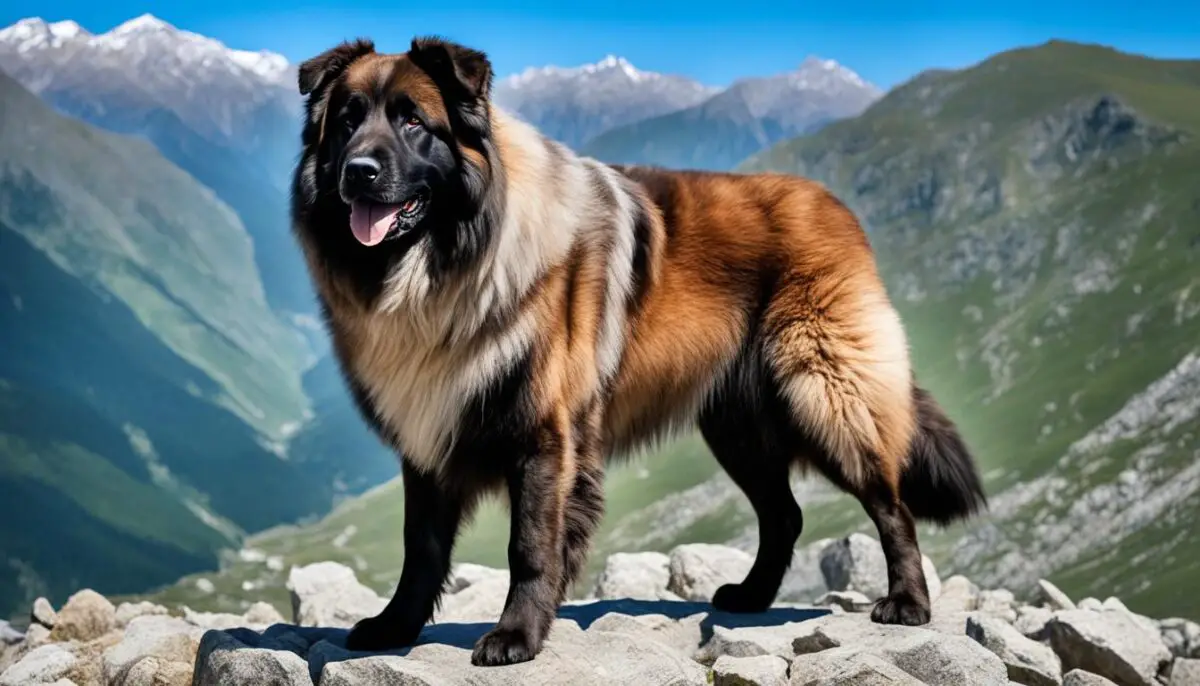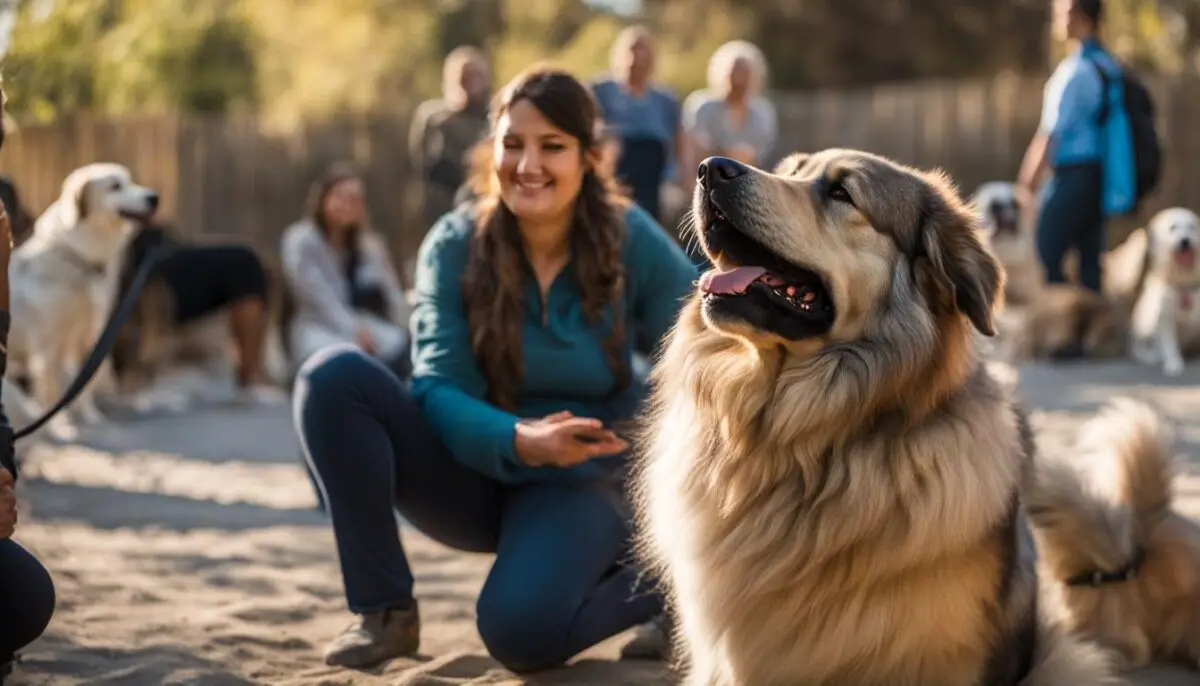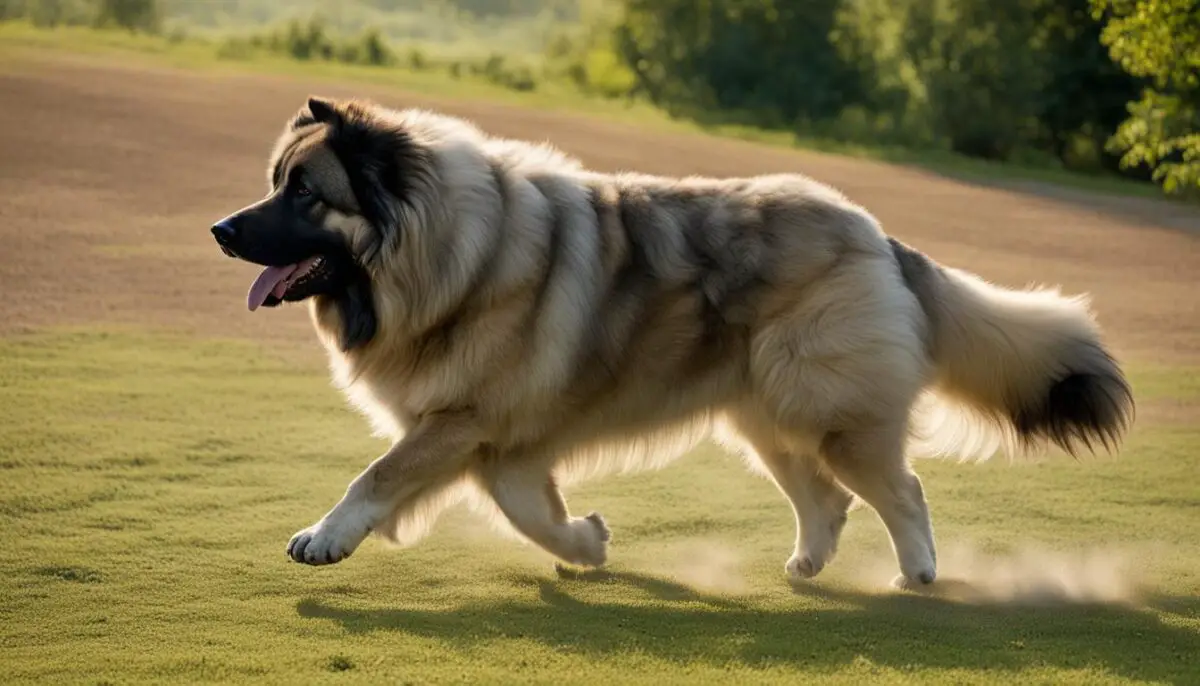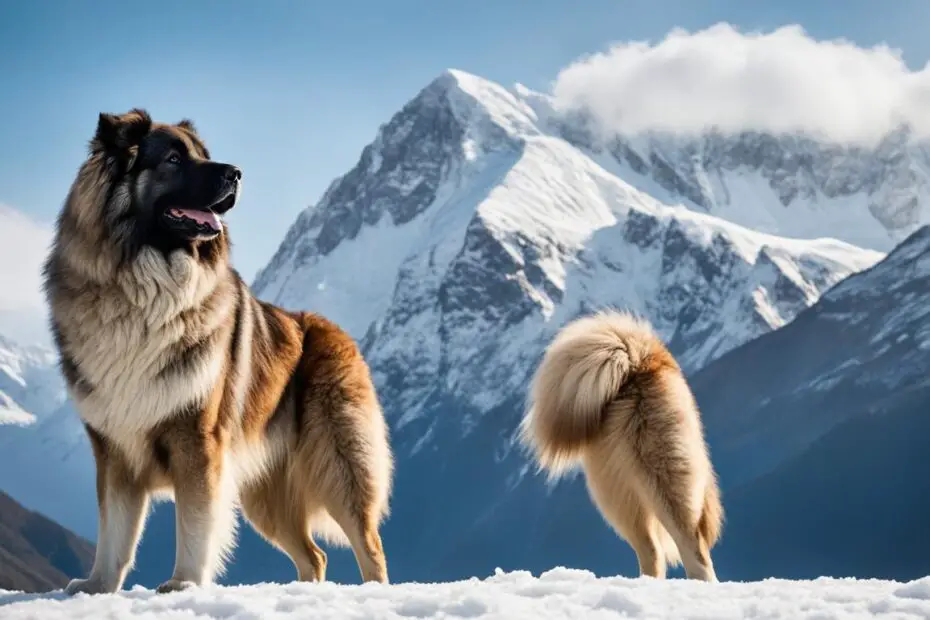The Caucasian Shepherd Dog, also known as the Caucasian Mountain Dog or Russian Bear Dog, is a breed renowned for its loyalty, strength, and courage. Originally bred in the Caucasus Mountain region, this noble breed has a distinct temperament that sets it apart from other dogs.
When it comes to Caucasian Shepherd Dog temperament, several key characteristics define their behavior and disposition. These traits include:
- Loyalty: Caucasian Shepherds are fiercely devoted and protective of their families. They form strong bonds and will go to great lengths to ensure their loved ones’ safety.
- Guarding Instinct: This breed’s natural instinct is to protect, making them excellent guard dogs. They are highly territorial and may display aggression towards strangers or other animals if not properly trained and socialized.
- Independence: Caucasian Shepherds are intelligent and independent, which can result in stubbornness during training. Patience and consistency are key when working with these dogs.
Understanding the nature of Caucasian Shepherds is essential for potential owners. These dogs are not recommended for novice owners or those living in small apartments due to their large size and demanding nature. However, with proper training, socialization, and care, Caucasian Shepherds can become loyal, loving companions.
Key Takeaways:
- Caucasian Shepherd Dogs are known for their loyalty, strength, and courage.
- They have a natural guarding instinct and can be aggressive towards strangers and other animals if not properly trained and socialized.
- These dogs are intelligent and independent, which can make them challenging to train.
- Caucasian Shepherds are not suitable for novice owners or apartment living.
- With proper training and care, they can be loving and devoted family members.
Origins and Characteristics
The Caucasian Shepherd Dog, also known as the Caucasian Mountain Dog or Russian Bear Dog, has a rich history that can be traced back to the rugged Caucasus Mountains between Europe and Asia. This ancient breed evolved in a harsh climate and was primarily bred to guard flocks and protect homes from predators.
Known for their large and imposing stature, Caucasian Shepherds are truly a majestic presence. Males can reach heights of 27.5-30 inches and weigh between 110-154 pounds, while females are slightly smaller, reaching heights of 26.5-29 inches and weighing between 90-110 pounds.
One of the most striking physical features of the Caucasian Shepherd is their magnificent coat. They possess a long, thick, double coat that can be either straight or curly. This coat provides them with insulation from the cold climate of their mountainous origins. The breed comes in a variety of colors, including but not limited to white, fawn, gray, and brindle.
The Caucasian Shepherd falls into the working group of dog breeds, characterized by their purposeful nature and strong working instincts. They have a lifespan of around 10-12 years, providing many years of devoted companionship to their owners.
While their physical appearance is undoubtedly impressive, it is their temperament that truly sets the Caucasian Shepherd apart. These dogs are known for their unwavering loyalty and strong protective instincts. They are independent and fearless, making them excellent guardians and watchdogs.

Key Characteristics of the Caucasian Shepherd:
- Large and imposing stature
- Long, thick, double coat in various colors
- Lifespan of 10-12 years
- Working breed group
- Independent and protective temperament
It is important to note that alongside their devoted loyalty, Caucasian Shepherds can be wary of strangers and unfamiliar animals. Early socialization and proper training are vital to ensure they develop into well-rounded and well-behaved companions.
Training and Socialization
Caucasian Shepherds are highly intelligent and independent dogs that require early and consistent training. Positive training methods should be employed to build a strong bond and ensure obedience. Establishing yourself as the pack leader is essential to instill discipline and respect in your Caucasian Shepherd.
When training a Caucasian Shepherd, it is crucial to be patient, as these dogs can be stubborn at times. However, with persistence and a calm yet assertive approach, you can effectively train them to respond to commands and behave appropriately in different situations.
One important aspect of training is socialization, which is necessary to prevent any aggressive tendencies towards strangers and other animals. Exposing your Caucasian Shepherd to various environments, people, and animals from a young age will help them develop confidence and adaptability.
Professional trainers and behaviorists can provide valuable guidance and assistance in training and socializing your Caucasian Shepherd. They have the expertise to manage the breed’s protective instinct and help foster positive interactions with others.
The Importance of Training and Socializing
Proper training and socialization are fundamental for a well-behaved and well-adjusted Caucasian Shepherd. Here are some key reasons why training and socialization are essential:
- Preventing aggressive behavior: Socializing your Caucasian Shepherd from an early age helps them learn proper behavior and reduces any aggressive tendencies they may have towards strangers or other animals.
- Establishing control and obedience: Training is crucial for establishing yourself as the pack leader and ensuring that your Caucasian Shepherd follows commands and behaves appropriately.
- Building trust and bonding: Training sessions provide an opportunity to strengthen the bond between you and your dog, fostering trust and cooperation.
- Promoting adaptability: Socialization exposes your Caucasian Shepherd to different environments, people, and animals, enabling them to adapt and remain calm in various situations.
Proper training and socialization play a vital role in shaping the behavior and temperament of a Caucasian Shepherd. By investing time and effort in training, you can enjoy a well-mannered and socially confident companion.

| Training Tips for Caucasian Shepherds | Socialization Techniques |
|---|---|
|
|
Exercise and Grooming
While Caucasian Shepherds are not high-energy dogs, it is important to provide them with regular exercise to support their physical and mental well-being. Daily walks, playtime, and engaging activities can help satisfy their exercise needs.
In addition to exercise, grooming is an essential aspect of caring for a Caucasian Shepherd. Their thick, double coat requires regular brushing to prevent tangles and mats, especially for dogs with longer coats. This grooming routine not only keeps their coat healthy and free from debris but also helps to minimize shedding.
When it comes to bathing, Caucasian Shepherds should be bathed as needed to keep their coat clean and free from dirt. It’s important to use a gentle dog shampoo to avoid irritation or dryness of the skin. Regular nail trimming is also necessary to keep their nails at a comfortable length.
One peculiar characteristic of this breed is their tendency to drool. To manage this, it is recommended to keep a towel handy to quickly clean up any drool or slobber.
Overall, exercising and grooming your Caucasian Shepherd are essential parts of their care routine. Regular physical activity and proper grooming practices contribute to their overall health and well-being.

| Exercise Needs | Grooming |
|---|---|
|
|
Health and Care
When it comes to the health of Caucasian Shepherds, they are generally a robust and sturdy breed. However, like any dog, they can be prone to certain hereditary health problems. It is crucial for owners to be aware of these issues and take proactive measures to ensure the well-being of their furry companions.
Common health problems that Caucasian Shepherds may experience include:
- Hip and Elbow Dysplasia
- Heart Problems
- Entropion (Eyelid abnormality)
- Obesity
- Bloat
To maintain the health of your Caucasian Shepherd, regular veterinary check-ups are essential. These visits allow for early detection of any potential health issues and ensure that your dog receives the necessary vaccinations and preventive care.
In addition to regular vet visits, proper nutrition is vital for the overall well-being of your Caucasian Shepherd. Providing a balanced diet tailored to their size and activity level will help prevent obesity and promote optimal health. Consult with your veterinarian to determine the most suitable feeding plan for your dog.
Creating a safe and comfortable living environment is also crucial for the care of Caucasian Shepherds. They require a spacious area to move around and exercise, as well as proper shelter to protect them from extreme weather conditions.
Grooming
A proper grooming routine is necessary to keep your Caucasian Shepherd’s coat healthy and free from matting and tangles. Regular brushing, at least once or twice a week, will help remove loose hair and prevent the buildup of dirt and debris. Bathing should be done as needed to keep your dog clean and fresh.
It is important to remember that Caucasian Shepherds are known to drool, so keeping a towel handy can be helpful in managing this trait. Additionally, maintaining proper dental hygiene by regularly brushing your dog’s teeth and providing dental treats can help prevent oral health issues.
Regular veterinary check-ups, proper nutrition, and a well-established grooming routine are essential for maintaining the health and well-being of your Caucasian Shepherd.
| Health Issue | Description |
|---|---|
| Hip and Elbow Dysplasia | A hereditary condition where the hip or elbow joint does not develop properly, leading to pain and lameness. |
| Heart Problems | Various heart conditions can affect Caucasian Shepherds, including heart murmurs and congestive heart failure. |
| Entropion | An eyelid abnormality where the eyelid rolls inward, causing the eyelashes to irritate the surface of the eye. |
| Obesity | Caucasian Shepherds can be prone to weight gain if not provided with a proper diet and sufficient exercise. |
| Bloat | A potentially life-threatening condition where the stomach twists, leading to a buildup of gas and preventing the dog from belching or vomiting. |
Conclusion
The Caucasian Shepherd Dog is a loyal and protective breed that requires proper training, socialization, exercise, and grooming. This breed is not suitable for novice owners or apartment living due to its size and independent nature. However, with the right care and handling, Caucasian Shepherds can become loving and devoted family members.
When considering a Caucasian Shepherd Dog, it is crucial to choose a reputable breeder or consider adoption from rescue organizations. This ensures the temperament and well-being of the dog. Understanding the unique temperament of the Caucasian Shepherd is key to providing them with a fulfilling and happy life.
In summary, the Caucasian Shepherd Dog is a magnificent breed for experienced owners who can provide the necessary training and socialization. With their natural protective instincts and loyalty, these dogs can be exceptional companions and guardians. By dedicating time and effort to their care and understanding their temperament, Caucasian Shepherds can thrive in a loving and nurturing environment.
FAQ
What is the temperament of the Caucasian Shepherd Dog?
The Caucasian Shepherd Dog is known for its loyal, strong, and courageous temperament. They are highly protective and have a territorial nature.
Are Caucasian Shepherds aggressive towards strangers?
Yes, if not properly trained and socialized, Caucasian Shepherds can be aggressive towards strangers.
Can Caucasian Shepherds be difficult to train?
Yes, Caucasian Shepherds can be stubborn and difficult to train, requiring early and consistent training using positive methods.
Are Caucasian Shepherds suitable for novice owners or apartment living?
Due to their size and independent nature, Caucasian Shepherds are not recommended for novice owners or apartment living.
Can Caucasian Shepherds be good family companions?
With proper training and socialization, Caucasian Shepherds can make excellent family companions.
What is the lifespan of a Caucasian Shepherd?
The average lifespan of a Caucasian Shepherd is 10-12 years.
How do I train a Caucasian Shepherd?
Caucasian Shepherds require early and consistent training using positive methods. Owners should establish themselves as pack leaders and seek professional assistance if needed.
How much exercise do Caucasian Shepherds need?
While not high-energy dogs, Caucasian Shepherds still require regular exercise to maintain their physical and mental well-being. Daily walks and engaging activities are recommended.
What is the grooming needs of a Caucasian Shepherd?
Caucasian Shepherds have a high shedding level and require regular brushing to prevent tangles and mats. They may also require baths as needed and nail trimming.
What are the common health problems of Caucasian Shepherds?
Caucasian Shepherds can be prone to hip and elbow dysplasia, heart problems, entropion, obesity, and bloat. Regular veterinary check-ups and proper nutrition are important for their health.

